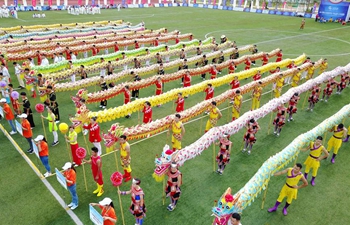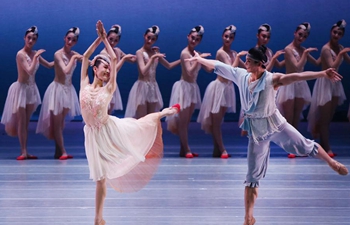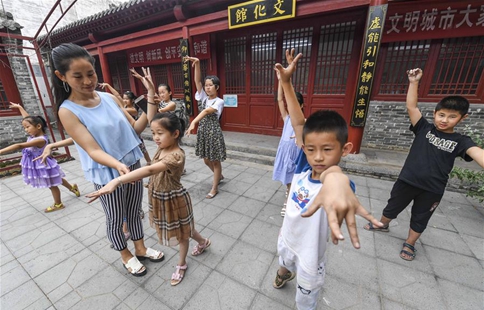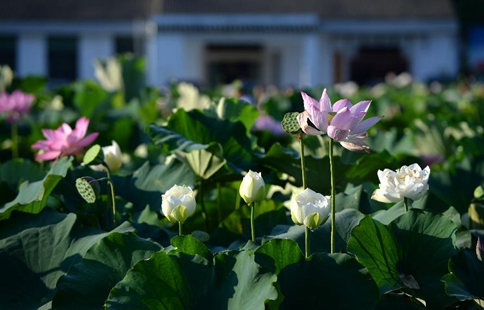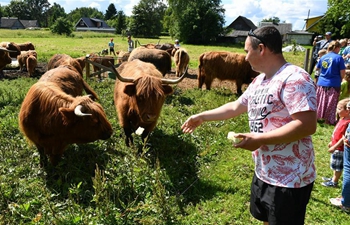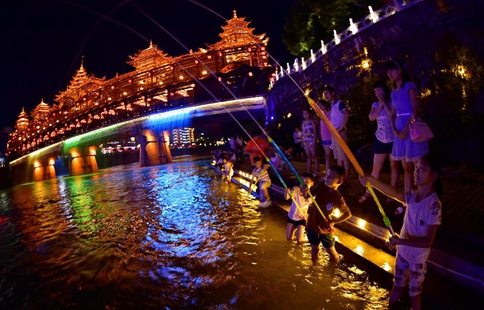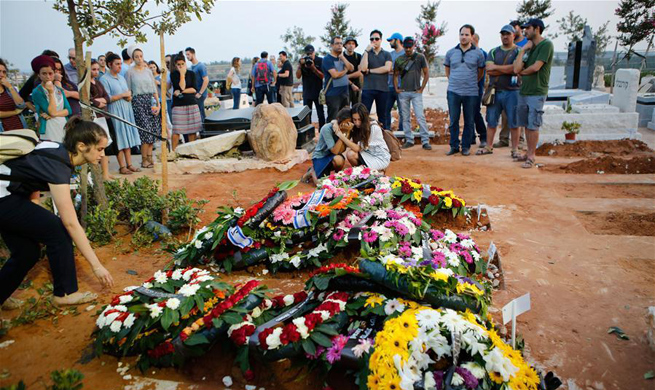BEIJING, July 24 (Xinhua) -- As high temperatures scorch China, people are finding surprising ways to beat the heat and turn a profit.
China's meteorological authority renewed an orange alert Monday morning as a heat wave is expected to sweep across much of the country.
On Monday, a heat wave will hit much of central and southern China, with temperatures in parts of Shanghai as well as Henan, Shandong and Fujian provinces hitting 37 to 39 degrees Celsius, according to the National Meteorological Center (NMC).
Some areas are even likely to see temperatures surpass 40 degrees Celsius, it added.
The NMC advised people in affected regions to take precautions against heat stroke and fire, including avoiding outdoor activities.
China has a four-tier weather warning system, with red representing the most severe, followed by orange, yellow and blue.
Last week, a student from Liberia suffered acute facial paralysis, after spending five days in an air-conditioned room in Changsha, capital of central China's Hunan Province. Temperatures in the city exceeded 30 degrees Celsius throughout the week.
The student, Jones, who studies rice cultivation in Changsha, turned on his air conditioner all night to escape the scorching heat, according to Hunan Economic TV Station.
"I'm from Liberia, and we do have very hot weather, but not compared to the past days in Changsha," he said. "It has been very hot."
"BEAT THE HEAT" ECONOMY
While people suffer in the heat, some are cashing in on the extreme weather.
The southwestern province of Guizhou, for instance, is offering discounted tickets for tourism sites, airline tickets and highway passes to attract visitors to its cool mountainous areas. The province is also providing subsidies for chartered planes for group tours.
For Liang Chaojun, the government incentives mean more customers to his family inn in Jiuba Township, located on a 1,200-meter-high mountain in Guizhou's Zunyi City next to Chongqing Municipality, known as one of China's "four ovens" -- cities known for their steamy summer temperatures.
The township boasts 30 tourist sites, 1,383 family inns and 78 hotels, serving about 100,000 tourists from Chongqing each year.
"In Guizhou, tourists can enjoy the amazing Huangguoshu Waterfalls or stand in the shade of bamboo forests," said Wang Wenxue, a local tourism official.
According to a joint report released this year by the China Tourism Academy and the public service center under the China Meteorological Administration, more than 300 million tourists in China take tours to escape heat waves each summer. To meet demand, the China National Tourism Administration issued a circular in June seeking tours and travel destinations for summer tours.
"Now we can just stay at home to make money instead of going to big cities to find jobs," Liang said.
COOLING DOWN
Meanwhile, people are finding unorthodox ways to chill out during the dog days of summer.
In Dujiangyan City in southwest China's Sichuan Province, about 10,000 tourists headed to a national reserve over the weekend to play mahjong on the water, according to Shanghai Dragon TV.
Next to a river at the Hongkou tourist site, countless colorful beach umbrellas stood in shallow water. Visitors sat on chairs with their feet in the cool flowing water.
"The water is cool, and the flowing currents make my feet feel very good," said a visitor who was playing mahjong.
For residents in central China's Henan Province, one place is particularly good for seeking shelter from the sun: air-defense tunnels.
The provincial government has opened 153 air-defense tunnels to the public for free, providing desks, chairs, water, tea, newspapers, medicine and even Wi-Fi access. The tunnels are mostly located near big shopping malls or heavily trafficked subway stations.
Air-defense tunnels were built to shelter people, store materials and treat patients in the event of war. The Henan government has been opening the tunnels to the public since 2010. This year, the government pumped in 1.9 million yuan (280,900 U.S. dollars) to support safety checks, facility upgrades and decoration of the tunnels.
In the provincial capital of Zhengzhou, 21 such tunnels have been opened to the public.
"I think it's good," said a resident surnamed Fan, who was teaching his child how to play chess. "It's safe and clean here."
Temperatures in Zhengzhou are forecast to reach 38 degrees Celsius this week.
Fan said he brought his child to the tunnel because there were many other children taking advantage of the cooler temperatures.
"We don't want to go outside," Fan said. "It's way too hot!"




